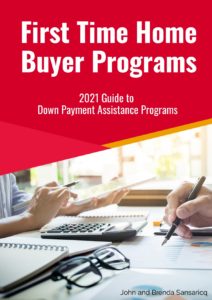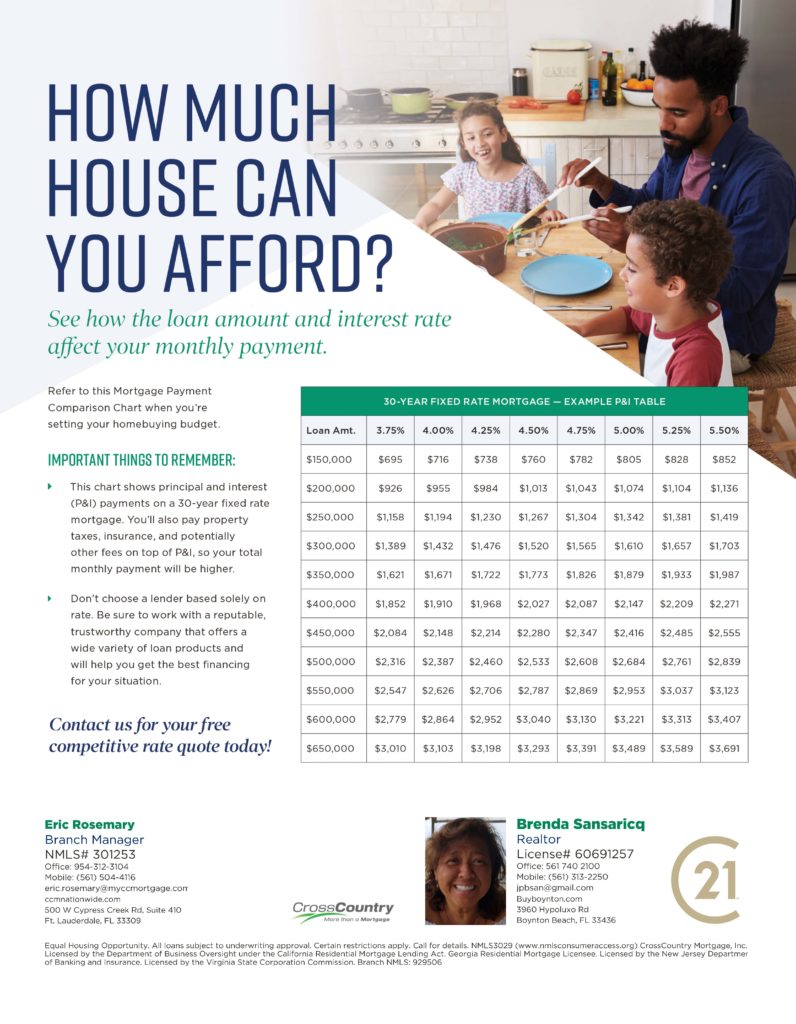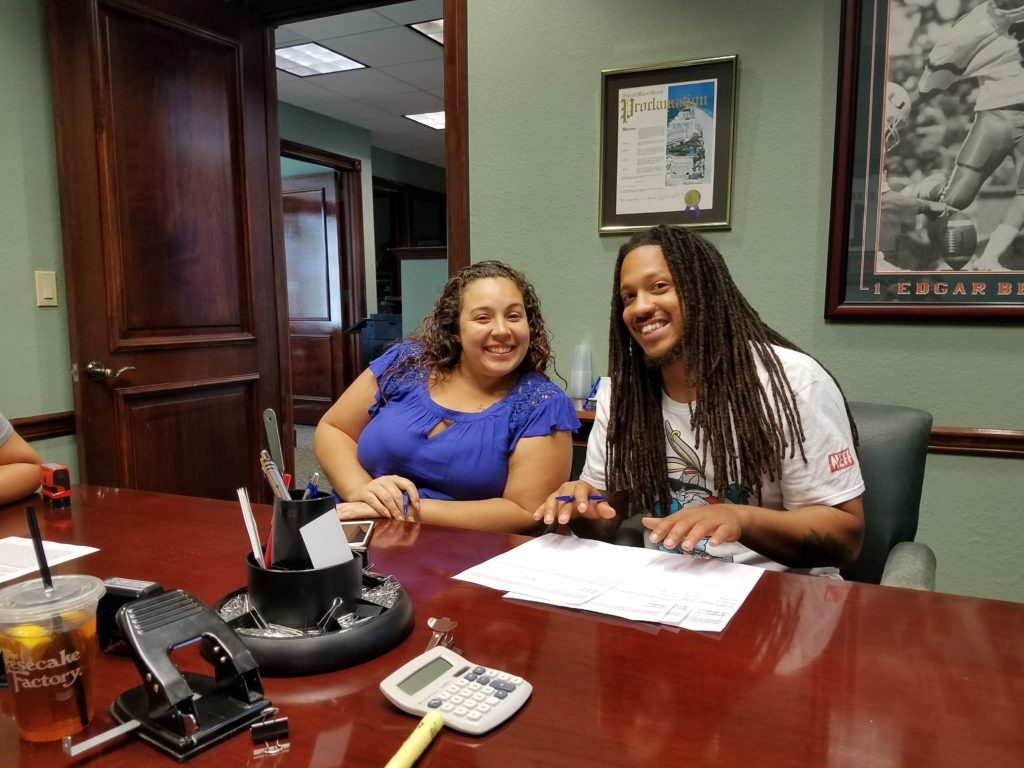What You Need To Know About First Time Home Buyer Programs
Who Qualifies for the First Time Home Buyer Programs?
Do you qualify for any of the First Time Home Buyer Programs? The definition of a “first time buyer” isn’t restricted to people buying their first homes. According to the Department of Housing and Urban Development, it also includes the following:
- A person who has not owned their principal residence for at least 3 years.
- A single parent who previously co-owned a home while married.
- A homemaker who previously owned with a spouse, but no longer receives financial support from that spouse.
- A person who has only owned a residence not affixed to a permanent foundation, such as a mobile or trailer home.
- This allows many people who wouldn’t assume that they qualify for a first time mortgage to take advantage of the benefits offered to those purchasing their first home.
Buyers using the First Time Home Buyer Programs can often be at a disadvantage to other buyers, due to having low funds, student debt, or other financial issues. Thankfully, being a first time buyer has some benefits too, such as being offered lower rates or smaller down payments on a home loan.
Take this Survey to find out if you qualify for any of the programs available to you through the Federal Government.
How to Choose the Best Lender for Your First Home Purchase
Finding the right lender depends on a number of factors, of which the interest rate is only one. But make sure the lender is qualified to offer First Time Home Buyer Programs. Here are some other things to look at when weighing up the various lenders:
Loan size: A basic requirement any borrower should expect of their lender is that they can offer the right loan amount. If you need a $250,000 loan, then there’s no use in going with a lender that will only approve $200,000. On the other hand, if you’re approved for $300,000, it’s important to be aware that you don’t have to spend that exact amount. You can still purchase a home for $250,000, and only borrow the amount you need.
APR: The first thing many borrowers look at when comparing lenders is the interest rate. While this is important, the best thing to look at is the APR. The Annual Percentage Rate, or APR, includes the interest rate plus processing fees and points, and therefore gives a more accurate picture of what you’ll be paying the lender each year. If you want to know your total cost, APR is the place to look.
Closing costs: Once your mortgage is approved, you will need to go through what’s called a closing process. At this stage, lenders can add any number of fees, including origination, surveying, title, and third-party fees. When you apply for your mortgage, it’s worth checking which lenders are willing to waive or discount these fees.
Loan terms: The term (or duration) of your loan can have a big impact on your APR and total loan amount, and therefore it’s important to select a term that suits your needs. The shortest term is usually a 15-year mortgage, though it is possible to find 10- or even 8-year terms, which include higher monthly payments but a lower interest rate. The longest term is usually a 30-year mortgage, which includes lower payments but a higher rate.
Customer service: Lastly, don’t forget the importance of customer service. As you go through the process of buying your first home, you’ll undoubtedly have a lot of questions, and it’s important to go with a lender that is willing to spend time on your application and offer the best deal to suit your specific needs. Many lenders now offer online applications, making it less costly and more convenient to apply for a loan, as well as personal loan agents and online chat applications.
The Advantages of First Time Buyer Programs
There are 2 major advantages of being a First Time Home Buyer:
- Qualifying for lower down payments through government-backed lending programs or offers from individual lenders
Many first time home buyers find that down payments are the biggest obstacle to purchasing a home. Using a median house price of about $250,000, and a typical minimum down payment of 20%, we find that most lenders expect borrowers to pay at least $50,000 as a down payment on their home – and many people just don’t have that sort of money lying around. Thankfully, some lenders offer home loans to first time buyers for down payments of as low as 3%.
There are also the first time home buyer programs that are government-backed FHA loans – these Federal Housing Administration (FHA) loans guarantee down payments of 3.5% for borrowers with at least a 620 credit score, and down payments of 10% for borrowers with as low as a 580 credit score. To qualify for an FHA loan, the borrower must purchase Private Mortgage Insurance (PMI), which protects the lender in the event the borrower defaults on a portion of the loan.
- Being able to deduct mortgage-related payments from your tax bill
Fortunately for first time buyers, certain mortgage expenses are tax deductible.
For example: you can deduct interest, provided your mortgage is secured by your home and is worth less than $1 million; and you can deduct real estate taxes. Unfortunately, PMI payments stopped being tax-deductible as of 2017, but this may change again in the future. If you’re a first time buyer, it’s worth consulting a tax specialist about how you can use your loan payments to reduce your tax bill.
The Short of It
Being a buyer who takes advantage of First Time Home Buyer Programs doesn’t necessarily mean you’ll need to make a huge down payment or that you’ll be taken advantage of by lenders. As long as you have a decent credit score and understand your rights before beginning the process, you should be able to come away with a mortgage to suit your needs – and that won’t drain your bank account on day one. When comparing lenders, don’t forget to look at all angles, such as terms, APR, and closing costs. And always ask what they can do for you as a first time buyer.
The process of purchasing your first home can be daunting and expensive, and it will likely include many financial situations you’ve never encountered. Luckily, the federal government and Florida state government have stepped in and created programs specifically for first-time home buyers. Even if you don’t have much to put toward a down payment, or you need a low interest rate, these loans and mortgage programs are great options that are worth looking into.
Pros and Cons of First Time Home Buyer Programs
FHA Loans
Pros
Low down payment requirements
Don’t need a high credit score for approval
Cons
Larger down payment needed for those with a credit score beneath 580
Eligibility
As little as a 3.5% down payment
Credit score must be 500 or above
Best For
Those who don’t have a great credit history
Don’t have money for a down payment
The Federal Housing Administration of the U.S. federal government backs FHA loans, though you’ll actually apply for one through an outside lender. These mortgages are a fantastic option for anyone looking to purchase a first home. That’s because you’ll only need to put 3.5% of your new home’s value at the time of purchase. Compare this to a conventional loan that requires a 20% down payment.
However, to receive this perk in its full glory you must have a FICO® credit score of 580 or higher. If not, you’ll be required to make a 10% down payment, which still represents a partial upgrade over a conventional mortgage. But even with this credit score requirement, an FHA loans falls under the category of easier-to-get mortgages.
VA LOANS
Pros
- Can have up to 100% loan coverage of your home’s value
- Usually come with lower closing costs than conventional loans
- No private mortgage insurance
Cons
- The application process can be drawn out
- Must pay a VA funding fee
Eligibility
- Must be a current or former military member
- Or a member’s spouse or another eligible beneficiary
- Must have a credit score of 620 or higher
Best For
- Veterans with little monthly income and savings for a comfortable down payment
The Department of Veterans Affairs insures VA loans, but third-party mortgage lenders actually issue them. These were created to help veterans who may have had enough monthly income to afford a mortgage but not enough savings to back up a down payment. In turn, VA loans do not call for any sort of down payment, meaning your new home’s value can be completely covered by your mortgage. This is essentially impossible to replicate outside of a VA loan, making it all the more valuable of a proposition.
In most situations, you need a 620 FICO®credit score to secure an approval for a VA loan. On top of this, you need to pay a VA funding fee, which will range anywhere from 1.25% to 2.4% of your home’s value depending on whether or not you choose to pay a down payment.
Aside from the funding fee, there’s almost no other extraneous costs to deal with on a VA loan. As a matter of fact, you won’t have to pay the typically obligatory private mortgage insurance because the government will back that half of your risk. You’ll also likely find that your closing costs will be cheaper than conventional and other mortgages, which should help you shore up your finances in the short term.
USDA Loans – First Time Home Buyer Program
Pros
- Veterans with little monthly income and savings for a comfortable down payment
Cons
- If you qualify for a conventional mortgage, you can’t get one
Eligibility
- Cannot make more than 115% of the adjusted U.S. median income
- Must purchase a home within an eligible rural area
Best For
- Low-to-mid income Americans looking to live in a rural or suburban area
A United States Department of Agriculture, or USDA, loan is legally known as a “Section 502 Single Family Housing Guaranteed Loan Program.” These mortgages are specifically intended to attract borrowers to move to rural (or at the very least, semi-rural) areas of the country. Simply find a single-family home that’s approved by the USDA to be eligible for a loan, and you’ll be free to apply.
Perhaps the most attractive feature of this mortgage is the fact that it completely eliminates the need for a down payment. But if your credit score falls a bit lower on the FICO® spectrum, you may have to pay a down payment of around 10%.
To make things even better, a USDA loan doesn’t require applicants to have a strong credit score and history. However, because of this, you will not be eligible for a USDA loan if your income level is higher than 115% of the current U.S. median income or if you have qualified for a conventional loan.
Good Neighbor Next Door – First Time Home Buyer Program
Pros
- Get a flat 50% discount on the value of your new home
- After three years, you can sell the home and keep all equity
Cons
- Not available to most people and in most areas
- You’re required to live in the home for at least three years following purchase
Eligibility
- Must be a police officer, firefighter, emergency medical technician or a pre-K to 12th grade teacher
Best For
- Teachers or emergency personnel with little in savings
The Good Neighbor Next Door Program is one of the more distinctive federal mortgage offerings on the market. It’s in place solely for emergency personnel and pre-K through 12th-grade teachers. Although not technically a loan, it allows these individuals to receive a 50% discount of the purchase price of a new home. To actually pay for the home, you could get a conventional, VA or FHA mortgage or pay cash.
There are some preconditions you must follow in order to remain eligible for this program, though. In order to save half off your home, it must be located within a “revitalization area” as titled by the Department of Housing and Urban Development (HUD). Furthermore, you must agree to make it your primary living residence for at least the next three years. The good news is that if you meet this term, you can sell the home if you choose and hold onto any equity and profit.
Fannie Mae/Freddie Mac – First Time Home Buyer Program
Pros
- Very low down payment stipulations
- Little to no credit needed for approval
- Many loan styles available
Cons
- Could come with higher interest rates
Eligibility
- In some cases, no income requirements in under-served areas
Best For
- Anyone who is looking for a low down payment loan option, but doesn’t qualify for any of the above options
Freddie Mac and Fannie Mae are mortgage lenders that were created by the federal government, and each have a number of first-time home buyer options. While they’re technically two different entities, they offer very similar benefits, each of which are more than suitable for anyone buying his or her first home.
The HomeReady® loan from Fannie Mae need only be accompanied by a 3% down payment. This makes it a great choice for anyone who’s strapped for cash, has a FICO® credit score as low as 620 and makes an income at or near the U.S. median. With a HomeReady® loan, you must have private mortgage insurance at the time of purchase, but once you’ve accrued 20% equity in your new home, you can cancel it.
On the other hand, Freddie Mac offers Home Possible® mortgages with down payments as low as 3%. The Home Possible loan comes in 15- to 30-year fixed-rate and 5/5, 5/1, 7/1 and 10/1 adjustable-rate terms, along with the aforementioned cancellable private mortgage insurance. You also will not need any credit history for this loan.
Native American Direct Loan – First Time Home Buyer Program
Pros
- Minimal credit score requirements
- No down payment and no private mortgage insurance
- Cheap closing costs
Cons
- Limited group of eligible borrowers
Eligibility
- Home must be located on allotted lands, Alaska Native corporations,
- Pacific Island territories or federally-recognized trusts
Best For
- Native American veterans that lack money for a down payment
Native American veterans and their spouses can apply for a Native American Direct Loan (NADL) for their new home. This VA-backed mortgage comes with many perks, but it most notably has a 0% down payment and set interest rate. Eliminating the need for a down payment opens up homeownership to many more buyers. This rate currently sits at 4.5%, though that is subject to change based on movement within the market and Prime Rate.
As far as credit conditions go, NADLs call for very little, so don’t get discouraged if you have a weak credit history. You also will not have to purchase private mortgage insurance, which is a perk that extends from normal VA loans. In an effort to cut down on the extra expense that closing costs can create, the VA has significantly lowered these fees associated with NADLs.
In addition to the programs available through the federal government, there are a few programs for first-time homebuyers offered through the state of Florida.
Florida HFA Preferred Conventional Loan – First Time Home Buyer Program
Pros
- Cheap mortgage insurance premiums
- Automatically qualifies borrower for an Assist Loan
Cons
- No direct down payment benefits
Eligibility
- Solely for first mortgages
Best For
- First-time home buyers looking to save on insurance
The Florida Housing Finance Corporation – HFA Preferred Conventional Loan is a 30-year fixed-rate mortgage that is great for anyone in need of cheaper private mortgage insurance for their new home. In theory, this will leave you more financial room to take care of other fees, such as closing costs. The “Housing Finance Agency (HFA) Innovation Fund for the Hardest-Hit Housing Markets” (HFA Hardest-Hit Fund) provides federal funding to states hardest hit by the aftermath of the burst of the housing bubble.
Although there is no direct down payment aid, you may qualify for the Florida Assist Loan. However, to get the Preferred Conventional Loan, it must be utilized as a first mortgage on a home.
Florida HFA Preferred 3% PLUS Conventional Loan – First Time Home Buyer Program
Pros
- Immediate qualification for HFA Preferred Grant helps shrink burden of down payment
- Lowered insurance costs
Cons
- Only comes as a 30-year loan
Eligibility
- Must be your first mortgage
Best For
- Anyone looking for down payment assistance
Florida HFA’s Preferred 3% PLUS Conventional Loan is slightly different than its counterpart. This mortgage option comes with both reduced mortgage insurance premiums, as well as direct down payment assistance. This will come in the form of an HFA Preferred Grant, which you will not have to pay back. It is a 30-year fixed-rate loan.
Similar to the above loan, the HFA Preferred 3% PLUS Conventional Loan has to be your home’s first mortgage.
HFA Preferred Grant – First Time Home Buyer Program
Pros
- Doesn’t have to be repaid
- Can help you pay your down payment/closing costs
Cons
- Will not apply to all borrowers
Eligibility
- Must be applying for an HFA Preferred PLUS loan
Best For
- Those who want a bit of extra financial help
While not a loan, the HFA Preferred Grant offer an opportunity for Florida residents to get essentially free financial assistance. Grants do not have to be repaid, and it can be as large as 3% of your home’s value. You can put this grant toward either your down payment or closing costs.
Although this comes with the Preferred 3% PLUS Conventional Loan, other applicants will find it a bit more difficult to qualify for than most other mortgages.
Florida Assist Loan Program
Pros
- As much as $7,500 in down payment assistance
- Payments are deferred until first loan is paid off or it’s not your primary residence
Cons
- Will extend your repayment process longer than your original loan
Eligibility
- Must have an initial mortgage to apply this to
Best For
- Anyone who cannot afford a normal down payment
For further down payment aid, Florida offers the Assist Loan. This can total as much as $7,500, but is required to be repaid, unlike the grant above. There is no interest on this mortgage, however. You are not required to begin making payments until either you refinance, you pay off your first mortgage or the home loses priority as your primary residence.
Though many mortgage applicants will likely be ecstatic with any form of assistance, this loan will make your repayment process longer than it would be with just your first loan. Also, unless you have a first mortgage, you’ll remain ineligible for the Assist Loan.
Florida Military Heroes Program
Pros
- Low interest rate
- Borrowers qualify for the Assist Loan program
Cons
- Limited applicant qualifications
Eligibility
- Must be active-duty military or a veteran
- Can only be a first mortgage
Best For
- U.S. military members
The Florida Military Heroes program allows those currently in the military and veterans special mortgage deals. First and foremost, they’re paired with significantly lower interest rates than typical home loans. On top of this, though, you’ll also qualify for the Assist Loan, which will provide down payment assistance in the form of an up to $7,500 second mortgage.
Because of the military-centric nature of these loans, they don’t apply to the vast majority of the Florida population. A Military Heroes loan can also only be for a first mortgage.
Florida Housing Mortgage Credit Certificate Program
Pros
- Can reduce your federal taxes up to $2,000/year from mortgage interest paid
Cons
- Limited qualifications
Eligibility
- Most first-time home buyers will qualify
Best For
- Those who are happy with their loan, but want to save on taxes
A Florida Housing Mortgage Credit Certificate is not a direct mortgage program, but it will help first time home buyers and certain veterans save on their annual federal income taxes based on how much they pay in mortgage interest. This is limited to up to $2,000 a year, as you can claim anywhere from 10% to 50% of your interest payments for the year.
Qualifying for one of the above first-time home buyer programs is just the beginning of the mortgage process. When it comes to finding a mortgage, it’s always best to do as much research and shopping around as possible. Be sure to check all lenders, interest rates and down payment stipulations.
A home is likely the biggest purchase you’ll make, as well as a big investment. That’s why it may be smart to consult a financial professional about how buying a home impacts your finances.
If you like what you’ve read and would like us to guide you in your own first time home purchase, please contact us to schedule a time to talk about buying your first home.
If you’d like to print this report, the .PDF for this report is available for Download below. Just click on the image below.

Home Equity Conversion Mortgage
Buy Your Dream Home with NO Monthly Mortgage Payments

For those of you age 62 and better there is a program you can use to purchase your next Dream home called the Home Equity Conversion Mortgage for Purchase. The HECM for Purchase program began in 2009 as a way to use a reverse mortgage to purchase a new home. It can be used to either downsize or upsize a retirement home.
If you dream about a new home with modern design, amenities, and low maintenance, then you owe it to yourself to learn more about this powerful alternative to using traditional financing or paying cash to purchase your next home.Imagine moving into a new neighborhood close to friends and family, with walking paths, a clubhouse and neighbors just like you… and doing all of this while retaining a large portion of your life savings.
The Home Equity Conversion Mortgage for Purchase loan program can potentially double your purchasing power and significantly reduce your out of pocket expenses as compared to paying cash or securing traditional financing. In essence, you can purchase a $600,000 home for about $312,388 and never have a monthly mortgage payment!*
This program comes at a time when a lot of Boomers are trying to protect their nest egg and boost monthly income. If you’ve been secretly wanting to move into a new home that better meets your lifestyle plan, then your time has finally arrived.
A HECM for purchase can Help you
- Double your purchasing power to buy a new home
- Let you stay at your home long-term
- Either downsize or up-size a retirement home.
For those downsizing, the HECM for Purchase could free up more assets from the sale of the previous home to be used for other purposes. For those upsizing with the financial resources to manage this sustainably and responsibly, the HECM for Purchase could allow for a more expensive home—especially considering the possibility that obtaining a traditional mortgage may become increasingly difficult after retirement.
To Learn more about this amazing Home Equity Conversion Mortgage for Purchase Program please give us a call or send us a message. We’ll be delighted to answer all your questions
Buying a Condo Just Got Easier
The U.S. Department of Housing and Urban Development recently revised its condominium loan policies to allow consumers greater access to mortgage loans that are federally guaranteed through the Federal Housing Administration(FHA). After Oct. 15, 2019, as many as 60,000 additional condo units will meet FHA-certification, making them eligible for buyers to purchase with an FHA loan.
The new guidelines will extend project certifications from two years to three, allow for single-unit mortgage approvals, allow a higher owner-occupant vs. renter occupancy ratio, and increase the number of units eligible to be purchased with FHA loans in a single project.
The FHA certifies eligibility for both condo projects and individual units, but according to the National Association of REALTORS, only 17,792 FHA condo loans were originated in the past year, out of approximately 8.7 million condo units nationwide.
The new relaxed guidelines are a significant improvement as condos are often more suitable and affordable to many singles, couples and small families who wish to take advantage of easier qualification, low-down-payment FHA loans – particularly first-time buyers.
Any impediment to buying a property can impact its desirability and market value. With approximately 84% of homebuyers purchasing a condo for the first time, the relaxed rules will promote more “affordable and sustainable homeownership, especially for credit-worthy first-time buyers.” The result should also make condos more marketable and easier to resell since the pool of available buyers and loans will be larger.
Contact us for more information.
What is Homestead Exemption?
The homestead exemption can save you generally between $750 to $1,000 in property taxes each year and is for permanent Florida residents.
A $25,000 exemption is applied to the first $50,000 of your property’s assessed value if your property is your permanent residence and you owned the property as of January 1st of the tax year. This exemption applies to all taxes, including school district taxes. An additional exemption of up to $25,000 will be applied if your property assessed value is between at least $50,000 and $75,000. This exemption is not applied to school district taxes.
How Do I Apply?
- E file at www.pbcgov.org/PAPA
- Complete the application online, print it out and mail it in to the office.
- Visit one of our 5 service centers to file in person
Property Appraiser Office Locations
Main Office
301 N Olive Ave. West Palm Beach, FL 33401
Phone (561) 355-2866
South County
14925 Cumberland Dr. Delray Beach, FL 33446
Phone (561) 276-1250
North County
3188 PGA Boulevard 2nd Floor, Palm Beach Gardens, FL 33410
Phone (561) 624-6521
Mid-West County
200 Civic Center Way, Suite 200 Royal Palm Beach, FL 33411
Phone (561) 784-1220
Belle Glade
2976 State Rd 15 Belle Glade. FL 33430
Phone (561) 996-4890
Value Adjustment Board
If you feel that the market value of your property is inaccurate or does not reflect fair market value, or you are entitled to an exemption or classification that is not reflected on the TRIM notice, you are encouraged to contact the Property Appraiser’s Office for an informal review. Call (561) 355-3230 to connect with an appraiser or exemption specialist to discuss your concerns.
Smart Ways to Save on Your Bathroom Renovation
Looking to liven up your bathroom? Better set aside some big bucks. According to HomeAdvisor, “The average bathroom remodel costs $10,354.” Don’t panic, you can still get a fresh, new look at a fraction of the cost, with these money-saving tips and tricks.
Keep the same layout
You might want to chuck it all and start over with a completely new layout, but the cost of moving water lines could push your budget into no-man’s land. According to HGTV’s Scott McGillivray, “Moving the tub, vanity, or toilet will cost about $2,500 each.”
Do your own tilework
Is the DIY spirit calling to you? Tiling your own bathroom floor and shower can be satisfying—and money-saving. Be sure to watch a tutorial or two first. It’s also a good idea to practice your technique on a piece of MDF with inexpensive tile before jumping in.
If you are springing for professional installation, keep in mind that large-scale tile will provide savings.
Go garage sale-ing
Yes, you can find some great accessories at garage sales, Craigslist or Nextdoor, but keep your eye out for larger pieces, too. An old dresser can easily be turned into a vanity. Not only will this save you money, it will also bring character into the space.
Resurface
“An old tub or shower will surely show signs of aging eventually, but before you swap things out for new, which can cost a pretty penny, consider resurfacing,” said Family Handyman. “Your tub or shower can be professionally resurfaced for much cheaper than buying new.”
Look for leftovers
Stone yards, tile shops, contractors—they may all have leftovers you can purchase or even have. That countertop remnant could work perfectly on top of that vanity you have your eye on, and save you enough money to buy it!
Thinking of Buying an Older Home? Here Are Some Things to Keep in Mind
When searching for the next house to call home, there’s a lot to consider. Opening your home search to older constructions can increase your options, however older homes may be harboring issues beneath the surface. Here are some things to consider (and have inspected) when purchasing an older home.
Foundation and Structural Issues
Due to their age, older homes should be inspected thoroughly for foundational and structural damage. Cracks or unevenness in the foundation can lead to moisture damage, dry rot, corrosion, and shifting of the house. According to Safewise, “Foundation repairs can escalate to over $10,000, depending on the extent of the structural issues – and homeowners insurance won’t cover these costs.” If you suspect structural damage, be sure to have the building inspected by a licensed structural engineer.
Electrical and Plumbing Issues
Many older homes have their original plumbing and wiring, as updating these systems can be costly. Keeping the original knob-and-tube wiring or the original cast-iron pipes, however, can be a serious safety hazard. Old electrical systems can cause a fire, and old pipes can cause leaks or weak water pressure.
Asbestos in Attic
Outdated Heating and Cooling Systems
Older homes were likely designed for oil, coal or wood heating systems and later retrofitted with newer HVAC systems, so it’s important to understand when and how these upgrades were made. Even a more up-to-date heating system can be inefficient and unsafe if it hasn’t been maintained properly.
Hazardous Materials
The older a home is, the more likely it is to contain hazardous materials, such as asbestos and lead. Lead is commonly found in paint applied before 1978 and in plumbing installed before 1985. Asbestos can be found in gas fireplaces, roofing, and insulation that was installed before 1980.
Houses with cooling systems are likely to be a bit newer, but outdated cooling systems are known to have their own issues. Common problems with older AC units include improperly working fans, reduced efficiency, refrigerant leaks, and electrical problems.
Termites and Bugs
Depending on where the home is located, termites and other bugs could be a major issue. The National Pest Management Association claims that termites alone cause around $5 billion in property damage yearly. The older the home, the longer it has been exposed to the chance of infestations.
How Much House Can You Afford?
If you’re in the market to buy a new home do you know how much you can afford. This chart will help you figure that out.

To download a copy of this flyer please click here.
Moving On Up.

Photo by Erda Estremera on Unsplash
You don’t want just anybody packing up all your worldly possessions and then driving off with them! Here are a few tips for selecting the right moving company to entrust with your move.
- What type of mover do you need: interstate, local, or perhaps a relocation service if it’s a corporate move?
- Ask for personal recommendations. Your friends, family, neighbors, or coworkers may have information on companies they loved (or hated.)
- Call and ask questions. How long have they been in business? How experienced are their drivers and packers? Do they offer storage? Take notes.
- Find out if each moving company is licensed and regulated, both in your state and for interstate moves if relevant. You can usually learn this from state agencies that regular transportation, like the Public Utility Commission (PUC) or the Department of Transportation (DOT).
- Does the mover belong to a trade organization, like the American Movers Conference? This can help in case you need to resolve a dispute.
- Check in with the Better Business Bureau to see if the company has received any formal complaints.
- Choose your top two or three picks and have them come to your home and put together an estimate.
While it may be tempting to simply pick the company that quotes you the lowest rate, you should make sure to factor trust into your decision. Moves can be stressful for a million reasons, but the right moving company can make this part, at least, a breeze.
Ready to take the next steps toward the home of your dreams?
Contact us so we can discuss your next move.
Congratulations to First Time Home Buyers.

Congrats to first time home buyers Jaclyn and Devon on the purchase of their new home. We wish all the best in your new home.
